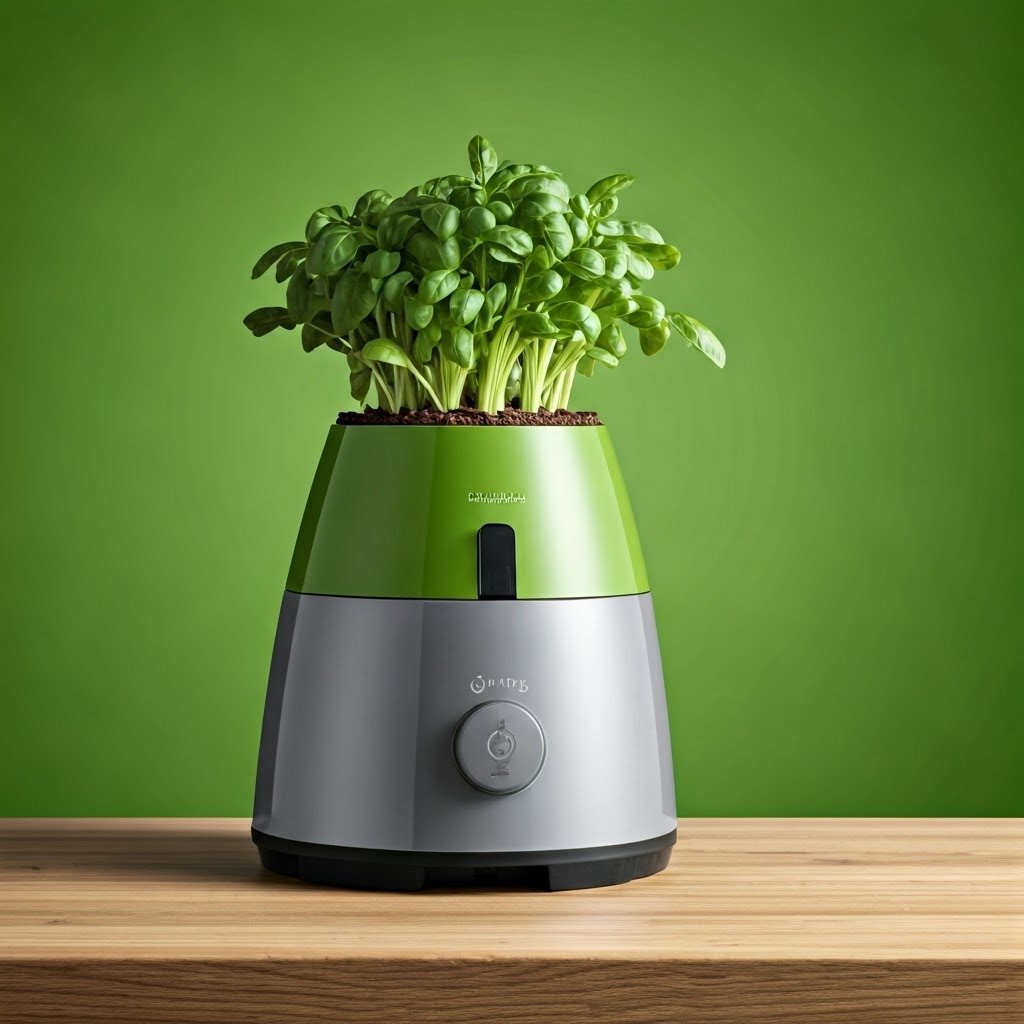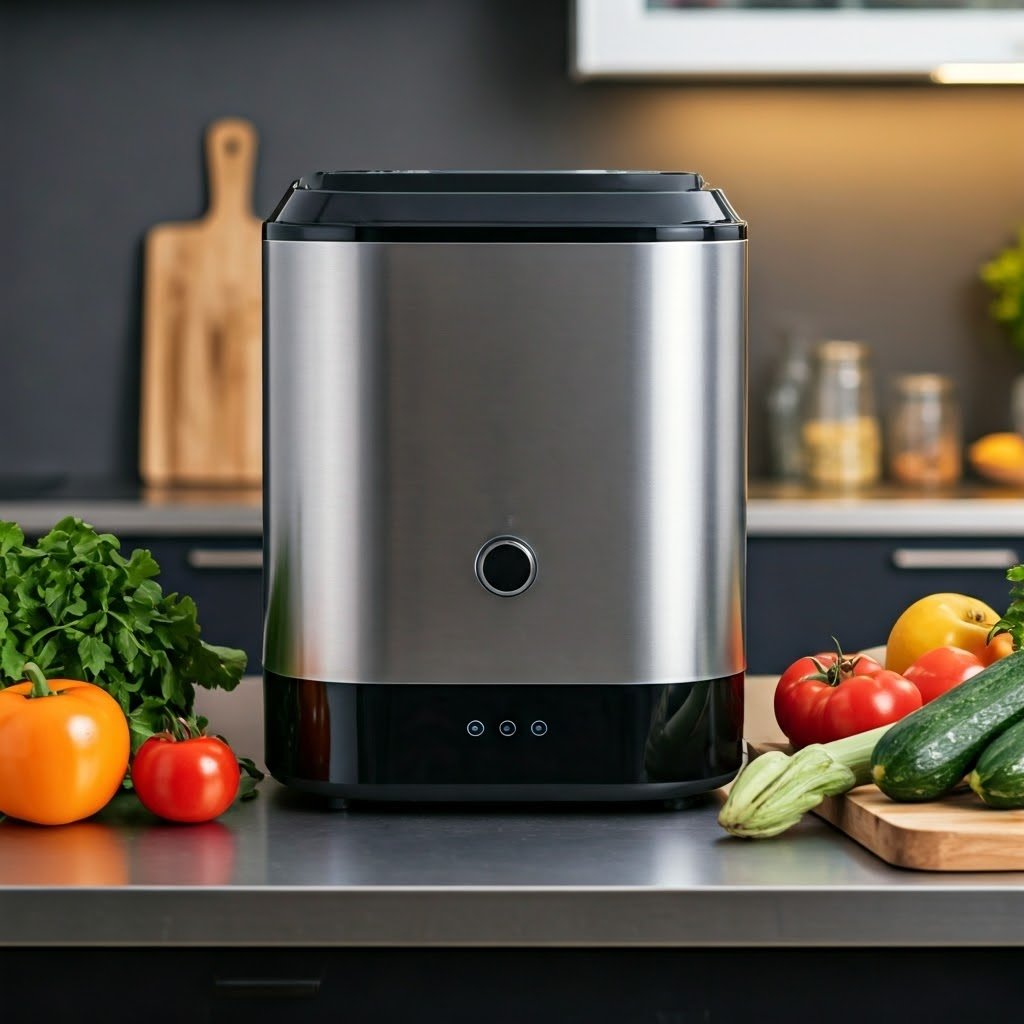
Electric Kitchen Composters:11 points
- Children’s illustration – A French Creative Life - March 24, 2025
- Caught by Collagraphs – A French Creative Life - March 24, 2025
- Develop Excel Skills From Basics to AI Integration With This $35 Course Bundle - March 24, 2025
As global waste management becomes a growing concern, the need for efficient, eco-friendly solutions has led to the rise of electric kitchen composters. These devices provide a fast, convenient, and environmentally sustainable way to recycle organic waste directly from the kitchen. This article explores the different types of electric kitchen composters, their benefits over manual and fire composters, and their role in various fields, including their application in adventure tourism, trekking, and waste recycling in urban areas.
Types of Kitchen Composters 
1. Electric Composters: Electric kitchen composters are high-tech devices that use electricity to accelerate the breakdown of organic waste into compost. They are usually compact, automated, and designed for home or small-scale commercial use. These composters employ heat, grinding, and airflow technology to quickly decompose kitchen waste, transforming it into nutrient-rich compost within hours or days.
2. Manual Composters: Manual composters are more traditional and require physical labour to manage the composting process. They rely on aerobic decomposition, where bacteria break down organic matter over a period of weeks to months. Manual composters usually need regular turning and maintenance but are simple, cost-effective options for smaller households.
3. Fire Composters: Fire composters are large-scale systems that use heat generated by combustion to break down organic waste. These systems are commonly used in industrial settings or for larger waste volumes. They can reach temperatures high enough to break down waste rapidly but may require significant energy and infrastructure.
Benefits of Electric Composters Over Manual and Fire Composters
1. Speed and Efficiency: Electric composters are faster than manual composters and much quicker than fire-based systems. While traditional composting can take months, electric composters can produce compost in as little as 24 hours. The use of heat, grinding, and aeration in electric composters speeds up the breakdown of organic matter, making them ideal for households or businesses with limited space and time.
2. Minimal Effort: Unlike manual composters, which require regular turning and aeration, electric composters are largely hands-off. They are fully automated, meaning you don’t need to manually mix the compost or monitor the temperature and moisture levels. Just add the waste, and the composter does the work, reducing the time and effort involved in composting.
3. Reduced Odour and Waste Volume: Electric composters are designed to reduce the foul odour that can occur in traditional composting methods. The enclosed design and active temperature control ensure that the waste breaks down cleanly without attracting pests or emitting unpleasant smells. Additionally, these devices can reduce the volume of kitchen waste by up to 90%, making it an ideal solution for households or businesses with limited space for waste storage.
4. Space-Saving and Convenience: Electric composters are compact and can be conveniently placed in kitchens or small outdoor spaces. This is particularly beneficial for city dwellers who may not have room for large compost heaps or manual composters.
5. Sustainability: Electric composters, when used properly, can significantly reduce the amount of organic waste sent to landfills. They recycle food scraps into valuable compost that can enrich soil and support plant growth, thus promoting sustainable living practices.
Domestic vs. Industrial Kitchen Composters
Domestic Kitchen Composters: Domestic composters are designed for home use and are smaller in size. They cater to individual households and are typically capable of composting smaller amounts of organic waste. These machines are ideal for people with busy lifestyles who want to manage their food waste efficiently and in an eco-friendly manner. They are easy to operate, require minimal maintenance, and fit comfortably in kitchen spaces.
Industrial Kitchen Composters: Industrial composters are large-scale systems designed to process a significant volume of organic waste. They are used in commercial kitchens, hotels, restaurants, and food processing industries. These machines are more robust and can handle large quantities of waste, producing compost at a much higher rate than domestic composters. Industrial composters are often more expensive and require professional installation and maintenance.
Environmental Impact of Electric Composters
Electric composters play a critical role in reducing food waste and minimizing environmental impact. In urban areas, organic waste makes up a large portion of the overall waste stream, and sending it to landfills creates significant greenhouse gas emissions, particularly methane, a potent greenhouse gas. By diverting kitchen waste from landfills and converting it into compost, electric composters help reduce carbon emissions, contribute to waste minimisation, and promote healthier soil for gardening and agriculture.
Electric composters also reduce the need for synthetic fertilisers, which are often harmful to the environment. Compost produced by these devices enriches the soil naturally, improving its structure and fertility while reducing the dependence on chemical fertilizers.
Applications of Kitchen Composters in Various Fields
1. Urban Waste Management: In cities, kitchen composters are a valuable tool for managing organic waste at the household level. They help reduce waste sent to landfills, which in turn decreases the environmental burden of waste management services. With proper composting, urban areas can recycle food scraps into valuable resources for local farming, parks, and green spaces.
2. Agriculture and Gardening: The compost produced by kitchen composters can be used to fertilise gardens, parks, and farms. The organic matter in compost improves soil quality, water retention, and plant health. Urban gardeners, small-scale farmers, and commercial horticulturists can use composters to create nutrient-rich soil for growing plants, vegetables, and fruits.
3. Adventure and Tourism: Electric composters are gaining popularity in the tourism industry, especially in eco-conscious destinations. Adventure tourism sites, remote campsites, and eco-resorts are adopting electric composters to manage waste sustainably. These composters can help reduce waste generated by visitors and staff, making it easier to recycle food scraps into usable compost for the local environment.
4. Trekking Sites and Trails: Trekking sites and hiking trails, especially in remote or eco-sensitive regions, benefit from the use of electric composters. Trekking groups, mountaineers, and campsite managers can use portable composters to treat food waste on-site. This prevents littering, reduces environmental pollution, and ensures that trekkers are leaving behind no waste. Moreover, the compost produced can be used to enrich the local vegetation along trails, promoting the restoration of the ecosystem.
Recycling Waste in Average Cities
In an average city, food waste constitutes a significant portion of the municipal waste stream. By adopting electric kitchen composters in households, it is estimated that cities could recycle up to 20–30% of their organic waste. For a city with a population of 1 million, this could equate to thousands of tonnes of food waste being diverted from landfills every year. If even 10% of households use electric composters, this could result in substantial environmental benefits.
Pros and Cons of Electric Kitchen Composters
Pros:
- Faster composting: Produces compost in 24–48 hours.
- Convenience: Requires minimal effort, and many models are automatic.
- Space-saving: Compact designs ideal for urban settings.
- Odour control: Closed systems prevent bad smells and pest issues.
- Reduces waste volume: Can reduce food waste by up to 90%.
Cons:
- Initial cost: Electric composters can be expensive.
- Energy consumption: While efficient, they require electricity to operate, increasing energy consumption.
- Maintenance: Some models may require occasional servicing or component replacement.
- Limited capacity: Domestic models may not be suitable for large households or businesses.
Leading Companies in Kitchen Composters
India:
- Bamboo House India: Specialises in eco-friendly composting products, including electric composters.
- https://mygreenbin.in/home-composter/My Green Bin : Offers various composting solutions, including electric composters designed for domestic use.
- Ecozyme: Known for its bio-based products, Ecozyme also offers efficient electric composting systems for homes and industries.
International:
- NatureMill (USA): A leading manufacturer of automatic, electric composters for homes.
- FoodCycle: Known for offering high-quality composting systems, including energy-efficient models for residential and commercial use.
- Zera Food Recycler (USA): A smart, app-controlled electric food composter for domestic kitchens.
Solar-Powered Electric Composters
Some modern electric composters are designed to work on renewable energy sources like solar power. Solar-powered composters use photovoltaic panels to generate electricity, reducing the environmental footprint and making composting more sustainable in off-grid locations, such as rural areas, adventure sites, or remote eco-tourism spots. While not as common, a few companies offer these sustainable solutions.
Automatic and Tabletop Composters
Automatic composters are fully automated systems that require no manual intervention once the waste is added. They are ideal for busy households, businesses, or individuals looking for low-maintenance solutions. Tabletop composters are smaller, compact models perfect for domestic kitchens. These countertop models are often designed for quick composting of smaller amounts of waste and are simple to use.
Electric kitchen composters are an innovative solution to managing organic waste efficiently while promoting sustainability. Whether used in households, industries, or adventure tourism settings, these devices provide a quick, space-saving, and environmentally friendly way to recycle food scraps. The benefits of faster composting, reduced waste volume, and positive environmental impact make electric composters an essential tool for modern waste management.













Leave a Reply